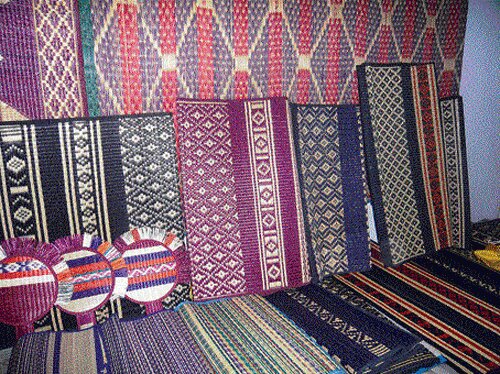Indian Heritage & Culture
Pathamadai Silk Mat
- 06 Aug 2019
- 3 min read
Inclusion of technology in the making of traditional Pathamadai silk mat through the use of electronic powerloom is ensuring higher production and income for weaving community.
- Handmade Pathamadai silk mats are also called Pattu paai.

- Traditional art of weaving pathamadai silk mat belongs to the Tirunelveli district of Tamil Nadu.
- Pathamadai mat is made up of Korai grass.
- Pathamadai mats have been granted Geographical Indication (GI) status by the trademarks and GI authorities.
- These are made specially for wedding ceremonies and have bride’s and groom's names as well as the wedding date woven in it.
Concerns
- Outdated handicraft methods used in the making of Pattamadai mats is facing tough competition from increased domestic and international demand and supply imbalance which has led to increased use of synthetic dyes and lesser focus on benefits for the weaver.
- Low cost and mechanisation of plastic mats are resulting in the decline of the silk mat industry.
Initiatives/Schemes to Promote Technology in Textile Production
- Sustainable and Accelerated Adoption of efficient Textile technologies to Help Small Industries (SAATHI) Initiative: Under this initiative, Energy Efficiency Services Limited (EESL), will acquire energy efficient powerlooms, motors and rapier kits in bulk and provide them to the small and medium powerloom units.
- Power Tex India: It is a comprehensive scheme for powerloom sector development.
- Merchandise Exports from India Scheme (MEIS): It is aimed at stimulating the growth of textile exports from India in various traditional and emerging markets.
- Textile sector is one of the biggest beneficiaries of the MEIS.
- Amended Technology Upgradation Fund Scheme for textiles industry (ATUFS): It is designed to provide incentives to entrepreneurs and business owners for upgrading technologies.
- Integrated Skill Development Scheme (ISDS): Textile weavers and workers lack formal training in using the latest technology which reduces their chance to get a better job and higher wages.
- ISDS plans to bridge this skill gap by training 1.5 million people.
- Scheme for Integrated Textile Parks (SITP): Under SITP scheme, the government will provide funding for infrastructure, buildings for common facilities like design & training centre, warehouse, factories and plant & machinery.




